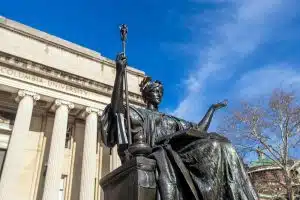Columbia’s Regular Decision Process
Deciding on the right college and navigating through the application process can be a challenging task. Many students find themselves overwhelmed by all the choices and deadlines. Gaining an understanding of the college admissions process can significantly smooth out this journey, and Columbia University is no exception. In this article, we will delve into Columbia University’s Regular Decision process.
The Basics of the Regular Decision Process
The Regular Decision process is a standard method by which colleges and universities, including Columbia, accept applications. With a later deadline than Early Decision or Early Action, it provides students with more time to complete their applications, collect necessary documents, and improve their academic records.
When it comes to applying to college, the Regular Decision process is an important option to consider. It allows students to have more flexibility in their application timeline and gives them the opportunity to carefully weigh their options before making a final decision.
Definition and Timeline
So, what exactly is the Regular Decision process? Essentially, Regular Decision is a non-binding round of applications that takes place after the Early Decision or Early Action rounds. This means that students who apply through Regular Decision are not obligated to attend the college if they are accepted.
Colleges typically set their Regular Decision deadline in January, but the specific date varies among institutions. For Columbia University, the Regular Decision deadline is typically on January 1st. This gives students the holiday season to finalize their applications and submit them before the deadline.
Once the Regular Decision deadline has passed, the university reviews the applications, and applicants are notified about admissions decisions generally by the end of March. This waiting period can be both exciting and nerve-wracking for students as they eagerly anticipate the outcome of their applications.
Importance of Regular Decision Process
The importance of the Regular Decision process lies in its flexibility. Because it isn’t a binding agreement like Early Decision, students have more time to compare offers from different colleges before making their final choice. This allows them to carefully consider factors such as financial aid packages, campus culture, and academic programs.
Furthermore, the Regular Decision process is particularly beneficial for those who need more time to polish their application or make a decision about where they want to study. It gives students the opportunity to showcase any improvements they have made in their academic record or extracurricular activities since the early application rounds.
Despite being non-binding, the Regular Decision process still involves a competitive pool of applicants. Colleges and universities carefully review each application, considering factors such as grades, test scores, essays, recommendation letters, and extracurricular involvement. Understanding this process is key to formulating a successful application strategy.
In conclusion, the Regular Decision process offers students the chance to carefully consider their college options and make an informed decision. It provides flexibility and allows for a more comprehensive application review. Students should take advantage of this opportunity to showcase their strengths and demonstrate their fit for the college or university they are applying to.
The Criteria for Columbia University’s Regular Decision
Columbia University, like many Ivy League schools, has high expectations of its applicants. Understanding these criteria can increase your chances of acceptance.
When it comes to academic requirements, Columbia University places a strong emphasis on academic excellence. It’s not just about good grades but also about rigorous course selections – especially in areas related to a student’s intended major. The university wants to see that applicants have challenged themselves and taken advantage of the academic opportunities available to them.
Standardized test scores, such as the SAT or ACT, are also considered by Columbia. However, it’s important to note that the university adopts a holistic approach and looks beyond pure academics. They understand that a student’s potential cannot be solely determined by test scores, and they take into account other aspects of an applicant’s profile.
Extracurricular activities and leadership roles serve as another significant aspect of the admission process at Columbia. The university values students who are actively involved in their communities and have shown a commitment to making a difference. Whether it’s being a student council president, leading a volunteer initiative, or participating in a sports team, these activities demonstrate passion, commitment, and leadership skills.
Personal essays and letters of recommendation also play a crucial role in the evaluation process. Personal essays provide applicants with an opportunity to showcase aspects of their personality, passion, and intellect that may not come across in their academic record. It’s a chance to tell their unique story and highlight what makes them a strong candidate for Columbia.
Letters of recommendation, on the other hand, provide valuable insights into a student’s behavior, character, and work ethic. They give the admissions committee a glimpse into how others perceive and evaluate the applicant’s abilities and potential. Strong letters of recommendation can greatly enhance an applicant’s chances of being accepted.
Overall, Columbia University takes a comprehensive approach to evaluating applicants for regular decisions. They consider academic achievements, extracurricular involvement, leadership roles, personal essays, and letters of recommendation. By understanding and meeting these criteria, you can increase your chances of being accepted into this prestigious institution.
How to Apply for Regular Decision at Columbia University
Now that the basics and the importance of the Regular Decision process have been explained, let’s delve into the specifics of how to apply for Regular Decision at Columbia University.
Applying to Columbia University is an exciting and competitive process. As one of the most prestigious Ivy League institutions, Columbia receives thousands of applications each year from highly qualified students all around the world. In order to stand out among the pool of applicants, it is important to understand the application checklist and follow some tips for a successful application.
Application Checklist
Firstly, the application process requires the completion of the Common Application, the Coalition Application, or the QuestBridge Application. These platforms allow you to provide your personal information, academic background, extracurricular activities, and other important details that will help the admissions committee get to know you better.
Alongside the application, the applicant must submit a high school transcript. This document provides a comprehensive overview of your academic performance throughout your high school years. It includes information about the courses you have taken, your grades, and any honors or awards you have received.
In addition to the high school transcript, recommendation letters play a crucial role in the application process. These letters are typically written by teachers, counselors, or mentors who can speak to your academic abilities, personal qualities, and potential for success at Columbia University. It is important to choose recommenders who know you well and can provide meaningful insights into your character and achievements.
Standardized test scores, such as the SAT or ACT, are also required for the application. These scores provide an objective measure of your academic abilities and help the admissions committee assess your readiness for college-level work. It is important to prepare for these tests and aim for scores that are competitive among Columbia’s applicant pool.
Lastly, an application essay is a vital component of the application. This is your opportunity to showcase your writing skills, express your personal experiences and aspirations, and demonstrate why you are a good fit for Columbia University. Take your time to brainstorm ideas, write multiple drafts, and seek feedback from teachers or mentors to ensure that your essay is compelling and well-crafted.
Tips for a Successful Application
While meeting the application requirements is essential, it is equally important to understand what Columbia University is looking for in prospective students. The university appreciates applicants who demonstrate intellectual curiosity, creativity, and commitment to their communities. Therefore, it is crucial to highlight these qualities throughout your application.
When writing your essays, make sure to convey your passion for learning and your desire to make a positive impact in your chosen field of study. Showcasing your unique experiences, interests, and perspectives will help you stand out among other applicants.
Furthermore, give yourself ample time to write and revise your essays. The application process can be stressful, and rushing through your essays may result in a less polished final product. Take the time to reflect on your experiences, brainstorm ideas, and craft well-written essays that truly reflect your personality and aspirations.
Additionally, it is important to establish strong relationships with your recommenders. Make sure your recommenders are well-informed about you and your accomplishments so they can provide detailed insights. Provide them with any necessary information, such as your resume or a list of your achievements, to help them write a strong and personalized recommendation letter on your behalf.
Finally, stay organized throughout the application process. Keep track of deadlines, gather all the necessary documents, and submit your application well in advance to avoid any last-minute technical issues. Taking a proactive and organized approach will demonstrate your commitment and attention to detail.
By following these tips and carefully preparing your application, you will increase your chances of being accepted to Columbia University. Remember, the admissions process is highly competitive, but with dedication, hard work, and a genuine passion for learning, you can present yourself as a strong candidate for admission.
What Happens After You Apply
Once you have submitted your application, it’s natural to wonder about the next steps of the process.
Review and Decision Process
Columbia uses a comprehensive review process by a team of admissions officers who consider every aspect of the application. Once reviews are complete, an admissions decision is made. Decisions are typically communicated by late March.
Notification and Next Steps
Upon receiving a decision, successful applicants will be provided with an acceptance letter detailing the next steps. Students are typically given until May 1 to accept or decline the admission offer.
Frequently Asked Questions about Columbia University’s Regular Decision Process
Are you curious about the Regular Decision process at Columbia University? We’ve got you covered! In this section, we’ll address some common questions and provide detailed answers to help you navigate through the application process.
Deferral and Waitlist Scenarios
So, what happens if you don’t receive an outright acceptance or rejection? Don’t worry. There are still options available to you. Columbia University offers two possibilities: deferral or waitlisting.
If you find yourself in the deferral category, it means that your Early Decision application was reviewed again during the Regular Decision pool. This gives the admissions committee another chance to evaluate your application and consider you for admission. It’s important to note that being deferred does not mean you have been rejected; it simply means that your application will be reevaluated along with the Regular Decision applicants.
On the other hand, if you are waitlisted, it means that you will be considered for admission if spots become available after May 1. This can happen if some accepted students decline their offers or if the university has additional spaces to fill. Being waitlisted means that the admissions committee sees potential in your application, but they need to wait and see how the class shapes up before making a final decision.
Financial Aid Considerations
Finances are a significant concern for many students and their families. At Columbia University, they understand the importance of affordability and strive to make education accessible to all qualified students. In fact, the university promises to meet 100% of the demonstrated financial need for all students admitted as first-years or transfer students pursuing their first degree.
If you have financial concerns, it is highly recommended to apply for financial aid during the application process. Columbia’s financial aid office will carefully review your application and work with you to create a financial aid package that suits your needs. Don’t let financial worries discourage you from applying; Columbia is committed to helping students achieve their educational goals.
Transfer Students and Regular Decision
Transfer students play a vital role in Columbia University’s Regular Decision process. While the process for transfers may differ slightly from that of first-year applicants, the university’s expectations remain the same. Columbia looks for academic excellence, leadership skills, and community involvement in all applicants, regardless of whether they are first-year or transfer students.
If you are considering transferring to Columbia, make sure to carefully review the transfer application requirements and deadlines. It’s essential to demonstrate your academic achievements, highlight your extracurricular involvement, and explain why Columbia is the perfect fit for your educational goals.
By understanding the Regular Decision process at Columbia University, you can strategically plan your application and increase your chances of receiving an acceptance letter from one of the world’s top universities. Remember to stay organized, submit all required materials on time, and showcase your unique qualities and experiences. Good luck!
How AdmissionSight Can Help You with College Admissions
AdmissionSight is a college consulting firm that provides personalized assistance to students throughout the college admissions process. Here are some ways that AdmissionSight can help you:
Admissions strategy: AdmissionSight can help you develop a strategic plan for your college application process. Our professional consultants can assist with identifying schools that are a good fit for your academic, extracurricular, and personal goals and help you plan and prioritize your application strategy.
Application review: AdmissionSight can review your application and provide feedback on how to improve it. We can offer suggestions on making your application stand out and highlighting your strengths and unique qualities.
Essay coaching: AdmissionSight can help you craft compelling essays that showcase your personality, goals, and achievements. We can guide you through the essay writing process and provide feedback on your drafts to help you refine your writing.
Interview preparation: AdmissionSight can provide interview coaching to help you feel confident and prepared for college interviews. Our experts can offer tips on how to present yourself professionally and how to answer common interview questions.
Extracurricular planning: AdmissionSight can help you plan and develop your extracurricular activities to make them more impactful and meaningful. We can suggest activities that align with your interests and goals and provide guidance on demonstrating your leadership and initiative.
Overall, AdmissionSight can provide valuable guidance and support throughout the college admissions process to help you maximize your chances of getting accepted into the college of your choice.
With a high success rate of over 75%, we have built a strong network in the past decade. Book an initial consultation today, free of charge!









































